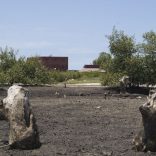Blue Forest is planting 40 million mangrove trees in central Mozambique
Conservation Community of Mozambique calls for ‘immediate and decisive investigation and response’ on Niassa security incidents – Carta

File photo: Niassa Lion Project /Facebook
The Conservation Community of Mozambique is calling on the state to ‘immediate and decisive investigation and response on recent security incidents in conservation areas, including the attacks on the Chapungo-Kambako Safaris main camp and the Mariri Environmental and Skills Training Centre in the Niassa Special Reserve, Niassa province, in April 2025.
Conservation areas in Mozambique cover 29% of the country’s land area.
In a statement issued on Saturday (17), the Conservation Community forum highlights that, in addition to maintaining biodiversity, they also benefit hundreds of thousands of people living in and around conservation areas, with combined investments of at least US$450 million in the last ten years alone.
Altogether, the group represents an annual investment of over US$59 million, employing over 3,000 Mozambicans and benefiting over 97,000 people through livelihoods, education, health and conservation-related benefits.
The Conservation Community group includes non-governmental organizations, state-owned organizations, local associations, community partners and private sector conservation investors.
“Conservation efforts should be recognized and safeguarded as a matter of national security interest – not undermined by instability or impunity – providing the critical foundation for human well-being, economic growth and climate resilience,” the Conservation Community urges.
The thirty or so signatories to the appeal include: African Parks, Buffalo Adventures, Naissa,, Cabassa Safaris, Chapunga-Kambako Safaris, Chuilexi Conservancy, Endangered Wildlife Trust, Fauna and Flora, Fundação Likhulu, Foundation François Sommer. Frankfurt Zoological Society, Incomati Conservação, Lipilichi Wilderness, Luwire Conservancy, Maputo Conservation Company, Mariri Investimentos, Mashambanzou Safaris, Mozambique Conservation Foundation, Mozambique Wildflife Adventures, Mozambique Wildlife Alliance, NATURA Moçambique, Niassa carnivore Project, Peace Parks Foundation, Rio Save Safaris, Rob Harris (Niassa Selous Wildlife Corridor), S.E.M. Lda. (Metapiri), Sabie Game Park, Safaris de Moçambique, Still Standing, Vilanculos Wildlife Sanctuary, Yambone Project.
The signatories also point out that the government and law enforcement authorities guarantee the safety of conservation workers and local communities living within or near protected areas and respond accordingly in the event of and for the duration of an emergency, but with a firm commitment to well-funded, well-trained and well-equipped anti-poaching scouts under the jurisdiction of the National Authority for Conservation Areas (ANAC) as the primary protectors of communities and biodiversity.
In this context, environmental defenders argue that any threats or attacks on conservation areas must be treated with the same seriousness as those directed at other strategic national infrastructure. They further ask that “stronger and ongoing coordination be established between the State and conservation partners to prevent future attacks, ensure accountability and uphold the rule of law within protected areas”.
Last April, Mariri tourist establishments in the Niassa Special Reserve were targeted by terrorist attacks, resulting in the death and injury of several workers and the destruction of various assets, including offices, rooms, warehouses and vehicles.
Mozambique’s protected areas are national and global heritage sites of ecological, cultural and economic importance, and must be protected from violence, exploitation and insecurity.












Leave a Reply
Be the First to Comment!
You must be logged in to post a comment.
You must be logged in to post a comment.